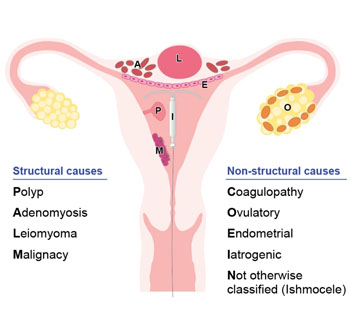Dysfunction Uterine Bleeding (DUB)
Dysfunctional uterine bleeding (DUB) or abnormal uterine bleeding (AUB) is a condition in which ladies are having heavy & irregular periods without any pelvic pathology.
The main cause of dysfunctional uterine bleeding is an imbalance in the sex hormones. Girls experiencing puberty and women entering menopause can have imbalanced hormone levels for months or even years. This causes sporadic bleeding, heavy bleeding, and spotting.
Spotting is bleeding that’s lighter than a normal menstrual period. It often appears brown, pink, or light red.
Conditions that often cause dysfunctional uterine bleeding are:
- Polycystic ovary syndrome (PCOS). This is an endocrine disorder that causes a woman to produce an increased amount of sex hormones. This may lead to an imbalance in estrogen and progesterone, making the menstrual cycle irregular.
- Endometriosis. This condition results when the uterine lining grows outside of the uterus, such as on the ovaries. Endometriosis often causes heavy bleeding during regular periods.
- Uterine polyps. These small growths occur within the uterus. Although their cause is unknown, polyp growth is heavily influenced by the hormone estrogen. Small blood vessels in the polyps can cause DUB, including spotting between periods.
- Uterine fibroids. Uterine fibroids are small growths that occur within the uterus, uterine lining, or uterine muscle. Like polyps, the causes of uterine fibroids are unknown. But estrogen seems to play a role in their growth.
- Sexually transmitted diseases (STDs). STDs that cause inflammation, like gonorrhea and chlamydia, may lead to DUB. Bleeding caused by STDs usually occurs after sex, when the lesions are aggravated.

Recognizing the symptoms of DUB
The most common symptom of DUB is bleeding outside of your normal periods. It can also occur within your menstrual cycle. Suspicious bleeding patterns include:
- Heavy menstrual bleeding
- Bleeding that contains many clots or large clots
- Bleeding that lasts more than seven days
- Bleeding that occurs less than 21 days from the last cycle
- Spotting
- Bleeding between periods
Other common symptoms that can occur with DUB are:
- Breast tenderness
- Bloating
- Pelvic pain or pressure
If you experience any of the following severe DUB symptoms, contact your doctor immediately:
- Dizziness
- Fainting
- Weakness
- Low blood pressure
- Increased heart rate
- Pale skin
- Pain
- Passing large clots
- Soaking a pad every hour

